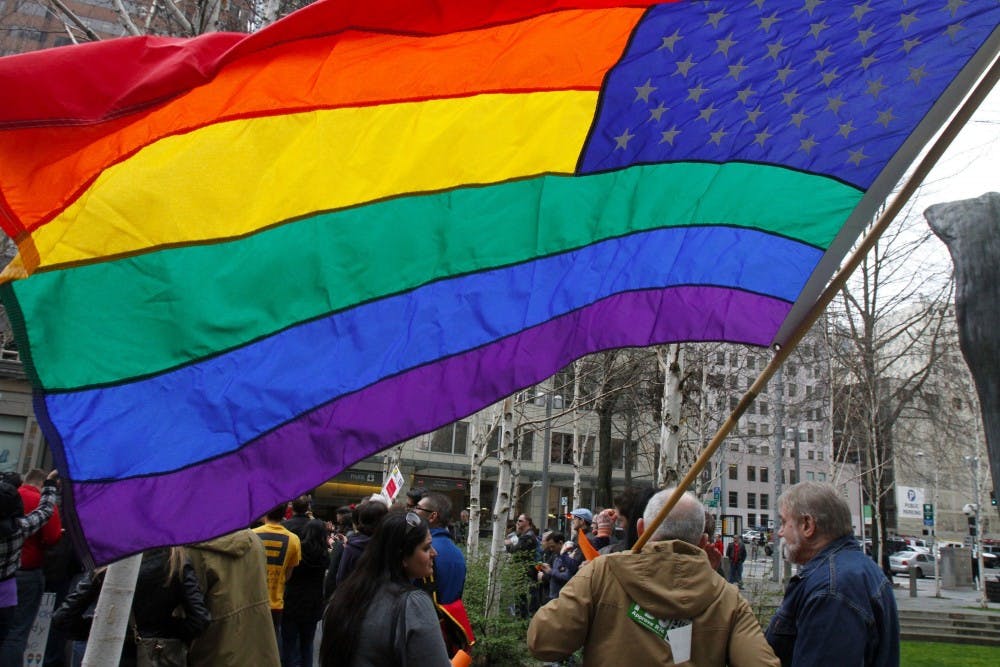WASHINGTON (AP) — The Supreme Court cleared the way Monday for an immediate expansion of same-sex marriage by unexpectedly and tersely turning away appeals from five states seeking to prohibit gay and lesbian unions. The court’s order effectively makes gay marriage legal now in 30 states.
Without comment, the justices brought to an end delays in same-sex marriages in five states— Indiana, Oklahoma, Utah, Virginia and Wisconsin. Chief Justice John Roberts did not say a word about same-sex marriage as he began the court’s new term.
Couples in six other states — Colorado, Kansas, North Carolina, South Carolina, West Virginia and Wyoming — should be able to get married in short order. Those states would be bound by the same appellate rulings that were put on hold pending the Supreme Court’s review
No other state cases were currently pending with the high court, but the justices stopped short of resolving for now the question of same-sex marriage nationwide. Still, those 11 states would bring to 30 the number of states where same-sex marriage is legal, plus the District of Columbia.
Challenges are pending in every other state.
Evan Wolfson, president of Freedom to Marry, called on the high court to “finish the job.” Wolfson said the court’s “delay in affirming the freedom to marry nationwide prolongs the patchwork of state-to-state discrimination and the harms and indignity that the denial of marriage still inflicts on too many couples in too many places.”
Ed Whelan of the Ethics and Public Policy Center, an opponent of same-sex marriage, also chastised the court for its “irresponsible denial of review in the cases.” Whelan said it is hard to see how the court could eventually rule in favor of same-sex marriage bans after having allowed so many court decisions striking down those bans to remain in effect.
The situation was changing rapidly Monday in the affected states.
— Wisconsin Gov. Scott Walker, a Republican, said the fight against same-sex marriage “is over” in Wisconsin. “With the Supreme Court’s announcement today, it is clear that the position of the court of appeals at the federal level is the law of the land and we’re going to go forward enacting it.”
— Virginia Attorney General Mark Herring, a Democrat, said marriage licenses could start to be issued to same-sex couples as early as Monday afternoon.
— In North Carolina, lawyers for same-sex couples said they planned to ask a judge Monday to overturn the state’s gay marriage ban.
— In Oklahoma, the clerk in the largest county said he would await a formal order from the Denver-based 10th U.S. Circuit Court of Appeals before he begins issuing marriage licenses to same-sex couples. That court had placed its ruling striking down the state ban on hold.
Experts and advocates on both sides of the issue had expected the justices to step in and decide gay marriage cases this term.
The justices have an obligation to settle an issue of such national importance, not abdicate that responsibility to lower court judges, the advocates said. Opting out of hearing the cases leaves those lower court rulings in place.
Two other appeals courts, in Cincinnati and San Francisco, could issue decisions any time in same-sex marriage cases. Judges in the Cincinnati-based 6th Circuit who are weighing pro-gay marriage rulings in Kentucky, Michigan, Ohio and Tennessee, appeared more likely to rule in favor of state bans than did the 9th Circuit judges in San Francisco, who are considering Idaho and Nevada restrictions on marriage.
James Esseks of the American Civil Liberties Union said he believes the court will quickly take up a case if an appeals court upholds state bans.
It takes just four of the nine justices to vote to hear a case, but it takes a majority of at least five for an eventual ruling. Monday’s opaque order did not indicate how the justices voted on whether to hear the appeals.
With four justices each in the liberal and conservative camps and Justice Anthony Kennedy more or less in the middle, it appeared that neither side of the court wanted to take up the issue now. It also may be that Kennedy, with his likely decisive vote, did not want to rule on same-sex marriage now.


